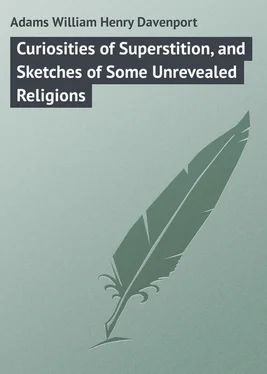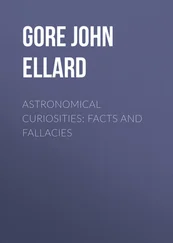William Adams - Curiosities of Superstition, and Sketches of Some Unrevealed Religions
Здесь есть возможность читать онлайн «William Adams - Curiosities of Superstition, and Sketches of Some Unrevealed Religions» — ознакомительный отрывок электронной книги совершенно бесплатно, а после прочтения отрывка купить полную версию. В некоторых случаях можно слушать аудио, скачать через торрент в формате fb2 и присутствует краткое содержание. Жанр: foreign_language, foreign_prose, на английском языке. Описание произведения, (предисловие) а так же отзывы посетителей доступны на портале библиотеки ЛибКат.
- Название:Curiosities of Superstition, and Sketches of Some Unrevealed Religions
- Автор:
- Жанр:
- Год:неизвестен
- ISBN:нет данных
- Рейтинг книги:4 / 5. Голосов: 1
-
Избранное:Добавить в избранное
- Отзывы:
-
Ваша оценка:
- 80
- 1
- 2
- 3
- 4
- 5
Curiosities of Superstition, and Sketches of Some Unrevealed Religions: краткое содержание, описание и аннотация
Предлагаем к чтению аннотацию, описание, краткое содержание или предисловие (зависит от того, что написал сам автор книги «Curiosities of Superstition, and Sketches of Some Unrevealed Religions»). Если вы не нашли необходимую информацию о книге — напишите в комментариях, мы постараемся отыскать её.
Curiosities of Superstition, and Sketches of Some Unrevealed Religions — читать онлайн ознакомительный отрывок
Ниже представлен текст книги, разбитый по страницам. Система сохранения места последней прочитанной страницы, позволяет с удобством читать онлайн бесплатно книгу «Curiosities of Superstition, and Sketches of Some Unrevealed Religions», без необходимости каждый раз заново искать на чём Вы остановились. Поставьте закладку, и сможете в любой момент перейти на страницу, на которой закончили чтение.
Интервал:
Закладка:
While the three parts already described exhibit more or less of a liturgical character, the fourth division, known as the Vendidad , forms a collection of customs, observances, laws, pains, and penalties, the growth of a period much later than that of Zarathustra, when Ritual began its encroachments on Religion. It is the essence of all genuine Ritual that it should illustrate and explain Doctrine, but this is never found to be the case in the primitive creeds. In all such it becomes merely the ingenious invention of a subtle priesthood, by which its members established their influence over an ignorant community. In the eyes of the unlearned its complex character invested it with an air of mystery; they were led to look upon the “form” as of greater importance than the “spirit,” and to attribute a strange, a wonderful potency to rites and ceremonies which they could not understand. While it is the special feature of the faith of Christ that it appeals in its sweet simplicity to every heart, and that it requires of the believer to present himself before the altar with the innocence and trustfulness of a little child; that it seeks not to confuse by a multiplicity of minute observances, and even sums up its leading tenets in two brief and easily intelligible commandments; Magianism, conscious of its inherent defects, unable to fall back on the redeeming sacrifice of a Saviour, deficient in any enduring principle of vitality, sought to build up its structure on a foundation of ceremonies and formalities. And when it could not feed the soul with the bread of truth, it dazzled the senses by imposing spectacles, and confused the imagination with a cumbrous code of the most complicated ritualistic frivolities; so that the Persian worship, with its incantations and devices, laid the foundation of the later Magic.
Turning our attention now to that portion of the Zendavesta which is called the Vendidad, we find that it is divided into twenty-two Fargards, or chapters.
In the first of these we find an account of the creation by Ahura-Mazda, of sixteen holy regions, sinless spotless Edens, localities of perfect bliss; each of which is destroyed in succession by Ahriman, the Spirit of Evil, – a fable evidently suggested by the Mosaic history of Paradise. The second treats of a certain king, Yimo Vivaugham, who introduced agriculture into the land of Iran. The third sets forth the various means by which Zoma, or the Earth, may be rendered happy. You must beware of excavating deep holes in it, for through these the devs , or demons, pass to and fro between hell and earth; nor must you bury within it the dead bodies of men or dogs, or other animals. The fourth chapter enumerates six categories of crime, and the several punishments connected with them. The fifth and sixth are occupied with a description of various kinds of impurity. The seventh and eighth contain liturgical directions in reference to the disposal of the carcases of men and dogs; 19 19 Dogs are here associated with man on account of their high value in an early stage of civilisation. Zarathustra protected them by special ordinances and penalties.
and it is stated that whoever eats of flesh so unclean can never be purified, but that hell will undoubtedly be his portion. Even the house in which a man or a dog dies must immediately be purified by the use of incense or sweet-smelling odours; a sanitary precaution of some importance in hot climates. In the ninth occurs an elaborate detail of the rite of purification denominated the Barathium , to be performed by, and on behalf of a person who shall have been unwittingly defiled by touching the dead. The tenth and eleventh are not less minute in their directions what word must be repeated twice, and thrice, and four times at the different Gâthas, in order that Ahriman and his lieutenants may be expelled from men and women who have been in contact with the dead, and from houses, cities, and provinces into which they have obtained an entrance.
The twelfth Fargard treats of various funeral ceremonies, and repeats a number of injunctions relative to the cleansing of places, of clothes and other articles, polluted by lifeless bodies. It concludes with elaborate warnings against a two-footed dev , called Ashmog. The thirteenth and fourteenth run riot in praise of the noble qualities of dogs, and severe in their rebuke of the “superior animals” who ill-use them. The fifteenth reads like a Commination Service, in its denunciation of certain crimes which can never be undone even by the profoundest penitential offices, and are punished by Ahura-Mazda with eternal condemnation. The seventeenth, like the sixteenth, is tediously liturgical, and discusses such minutiæ as the arrangement of the hair of the head, the extraction of bad or gray hairs, and the cutting of nails. If these operations are performed without certain prescribed ceremonies, the devs come upon earth, and parasitical organisms are produced to the great discomfort and injury of man. The eighteenth lays down the distinctions which should characterise an Athrava , or priest. He must wear the padan , a mouth-cover, of two fingers’ breadth; must carry an instrument for disposing of parasitical insects; devote his nights to study, keep alive the sacred fire, and succour the distressed. The nineteenth chapter recounts the perils to which Zarathustra was exposed, when he had left the south on his mission, from the murderous assaults of Ahriman and his host, who hastened up from the north; the north, to an inhabitant of the warm sunny south, naturally appearing the fit home and haunt of the Spirit of Evil. The twentieth is devoted to the praise of Taneslied, who is represented as having swept away disease, death, bloodshed, war, evil-doers, falsehood, and all kinds of wickedness. The twenty-first enjoins the salutations to be paid to the sacred Bull, and extols some of its illustrious qualities. Finally, the twenty-second narrates the mission of Zarathustra, and describes the evil he will dispel through the influence of the Word; Ahura-Mazda having ordered him to establish his worship in the region called Airya-Mava, or Irman, so that it may become bright, pure, and happy as the abode of Ahura-Mazda himself, free from sin, and, consequently, free from sorrow and suffering.
From this brief summary it will be seen that the religion of the Parsees in its present form is a definite Dualism, recognizing the existence of two distinct principles, Good and Evil, impersonated by spirits of equal power, named Ahura-Mazda, (or Spento-Manyus,) and Ahriman, (or Angro-Manyus.) But no such doctrine was taught by Zarathustra himself. His creed, like all the earliest creeds, was purely Monotheistic. He set before men, as the sole object of their love and adoration, one Supreme Being, Ahura-Mazda, the great “Life-Giver” or the “Living Wisdom,” as the name is variously explained. Nor was his conception of this one God altogether unworthy of the Founder of a Religion. He does not represent Him, indeed, as the “Father,” loving, sympathetic, compassionate, and so full of condescension, that He is willing to give His Son to die for the salvation of erring Humanity; for he did not enjoy that fuller revelation of the Divine Nature which was vouchsafed to the Hebrew race. But he shows Him as the “Lord over all lords, the Forgiving, the Omniscient.” He is ineffably pure, the source of all Truth, the Holy God. In the Khordah Avesta, Zarathustra is introduced as inquiring: “Tell me the name, O pure Ahura-Mazda, which is Thy greatest, best, and fairest name?” Ahura-Mazda replies: “My name is He who may be questioned: the Gatherer of the people: the Most Pure: He who takes account of the actions of men. My name is God (Ahura); My name is the Great Wise One (Mazdas.) I am the All-Seeing, the Desirer of Good for My creatures, He who cannot be deceived: the Protector: the Tormentor of tormentors: He who smiteth once and only once: the Creator of All.”
Читать дальшеИнтервал:
Закладка:
Похожие книги на «Curiosities of Superstition, and Sketches of Some Unrevealed Religions»
Представляем Вашему вниманию похожие книги на «Curiosities of Superstition, and Sketches of Some Unrevealed Religions» списком для выбора. Мы отобрали схожую по названию и смыслу литературу в надежде предоставить читателям больше вариантов отыскать новые, интересные, ещё непрочитанные произведения.
Обсуждение, отзывы о книге «Curiosities of Superstition, and Sketches of Some Unrevealed Religions» и просто собственные мнения читателей. Оставьте ваши комментарии, напишите, что Вы думаете о произведении, его смысле или главных героях. Укажите что конкретно понравилось, а что нет, и почему Вы так считаете.












